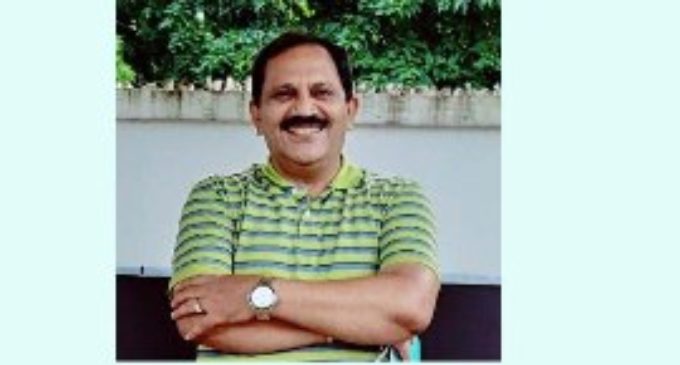Mahalaya is an auspicious occasion observed seven days before the Durga Puja

By Er Taraprasad mIshra
Jajpur, Octo 6 : To begin with, the day of Mahalaya marks the beginning of Devi Paksha and the end of the Pitri Paksha, the latter of which, is a period of mourning. Hindus consider Pitri Paksha to be inauspicious, because shradhh or death rites are performed during this period.
It is a 16-day lunar period during which people remember and pay homage to their ancestors using food and water offerings. Every year, the entire Bengali community and people from all walks of life rise up to one of the greatest occasions of India – Durga Puja. It is the festival of homecoming as Goddess Durga arrives on Earth along with her children to spend time with her paternal family – us.
The day of Mahalaya marks the arrival of Durga, who is considered the ultimate woman and the greatest source of power. The early morning radio announces, “Maa is here” and the festival kicks off spreading happiness and joy. Mahalaya is an auspicious occasion observed seven days before the Durga Puja, and heralds the advent of Durga, the goddess of supreme power.
It is an invocation and invitation to the mother goddess to rise, awake and descend on earth and annihilate the evils of the world by her Supreme Goodness – Jago Tumi Jago, Jago Durga…This is done through the chanting of mantras and shlokas and singing devotional songs. The day of Mahalaya ushers in the aura of Durga Puja. The day of Mahalaya is also the day of Remembrance. On this day, people offer Tarpan in memory of their deceased forefathers.
The banks of River Ganges in India are peopled with many priests seen busy performing Tarpan for devotees in groups. The rituals start from early dawn and last till mid-day. Devotees and worshipers observe a fast since morning and offer food, water, clothes and sweets to their forefathers. Thus, the auspicious Mahalaya day is religiously observed by performing this important ritual to remember our ancestors by doing the Tarpan in the names of those who were our near and dear ones but who are no longer alive with us today, though we cherish them in our hearts and minds.
After offering Tarpan, people break their fast and have their first meal of the day. Mahalaya signifies the termination of Pitri Paksha and the beginning of Devi Paksha, thus ushering in the season of religious festivals. Durgotsav, as this festival is known in Bengal, commences from Mahalaya ‘ this is the day that Goddess Durga is supposed to begin her journey with her children from her husband Shiva’s abode in Mount Kailash in the Himalayas to her parental home in the plains.
On this auspicious day, early morning, at 4a.m. a 2 hour long program is broadcast in Bengali from Aklashvani Kolkata in India. A translated version in Hindi is subsequently transmitted from all other important radio stations of the country.
Titled Mahisasur-Mardini (which means ‘the slayer of the demon-in-the-guise-of-a-buffalo’) this program narrates why and how Durga was conceived, how she was armed with a plethora of weapons by the Gods to destroy the Buffalo Demon – Mahisasur who was causing havoc in the cosmos and how she achieved her goal by annihilating him and ushering in peace and happiness to the World.
One man who’ll always be remembered for making the Mahalaya Radio Program memorable to one and all is Birendra Krishna Bhadra, the magical voice behind the narration of Mahisasur-Mardini. This legendary narrator recites the holy verses and tells the story of the descent of Durga to earth, in his inimitable style.
The program was first aired live on the radio way back in 1932. Birendra Krishna Bhadra was only 28 years old then. Birendra Bhadra has long passed away, but his recorded voice still forms the core of the Mahalaya program. In a sonorous, reverberating voice Birendra Bhadra renders the Mahalaya recital for two thrilling hours, mesmerizing every household with the divine aura of his narration, as the Bengalis submerge their souls in quiet moments of prayer.
Mahisasur-Mardini is a remarkable piece of audio drama based on the Hindu mythology and the Vedic mantras of the Chandi-Path. The programme was first organised by Premankur Aatorthi, Birendra Krishna Bhadra, Nripendra Krishna Mukhopadhya and Raichand Boral. It is a landmark composition scripted by Bani Kumar, and narrated by Birendra Krishna Bhadra.
The enchanting music is composed by none other than the immortal Pankaj Kumar Mullick, and the songs are rendered by famous singers of yesteryears – Dijen Mukhopadhya, Manobendra Mukhopadhya (Tabo Achinta’), Sandhya Mukherjee, Utpala Sen, Shyamal Mitra, Supriti Ghosh (Bajlo Tomar Alor Benu’) Hemant Kumar and Arati Mukherjee.
The renowned hero of the Mahabharata, Karna, after he had died and left his mortal remains on earth and ascended to Heaven, the great charity he had done on earth was returned to him hundred-fold. But, it was all gold and silver; there was no food, as he had not done any food-charity. He prayed to Yama – The God of Death to be sent back to Earth for 14 days, to make up for this deficiency.
Lord Yama agreed and restored his life on earth. For 14 days, he fed Brahmins and the poor, and offered oblation of water. On his return to heaven after those 14 days, he now had access to food in plenty. It is these 14 days that are commemorated in the Mahalaya Paksha.
Due to the grace of Lord Yama on Karna for having restored his life on earth for a fortnight, it has been ordained that offerings made during this period benefit all the departed souls, irrespective of they being connected to us or not. Charity in the form of food is important during this observance. Life sustains on food. One cannot preach religion and love to empty stomachs and starving souls.
The human body is an important vehicle for realizing God. Food plays a very important role in keeping the body healthy and fit for Yoga and Meditation. The gift of food is the greatest gift of all. Therefore, one should give food in plenty, to the hungry and needy, not only during the Mahalaya fortnight but all through the year.
Food charity is said to be the most benevolent of all charities and donations in the world as Food is a basic necessity for Human Life to survive on this Earth.
According to Hindu mythology, the 16 days gap between the full moon in the month of Bhadra that marks the Ganesh Festival and the new moon on Mahalaya is considered to be Pitri Paksha (fortnight of ancestors). The arrival of Maa Durga marks the end of Pitri Paksha.
On this day, all the sons and fathers pay homage to their ancestors of previous three generations by worshipping Goddess Ganges. The ritual is considered to be very auspicious. It is believed that doing so will earn one the blessings of his ancestors and he will be free from all evil. This ritual is called tarpan. Another legend says that when Karna died and ascended to heaven, Indra gave him gold to eat.
In explanation, Indra said that Karna had always donated gold in the name of ancestors and not food. Karna was permitted to return to Earth for 15 days to offer food as homage to his ancestors. This period is also called Pitri Paksha and is considered a reason behind the ritual. Tarpan is said to be a highly auspicious ritual in the Puranas.
The offering of respect to the ancestors is regarded compulsory as this ensures a safe passage to heaven for the ancestors. On this day, the banks of the Ganges River in Bengal can be seen filled with thousands of people who flock there early morning to offer homage to their ancestors. The preparation of Mahalaya begins from the day before Mahalaya.
It is that one day of the year when every Bengali household wakes up at 4AM to listen to the radio broadcast of Mahishasur Mardini. The script was written by Bani Kumar and Pankaj Mullick composed the music.
Legendary singers such as Dwijen Mukhopadhyay, Manabendra Mukhopadhyay, Sandhya Mukhopadhyay, Arati Mukhopadhya, Utpala Sen, Shyamal Mitra and Supriti Ghosh lent their voices for this hour-and-a-half long radio show where legendary radio show host Birendra Krishna Bhadra chants the soulful slokas of Maa Durga’s triumph over the demon king Mahishasura.
Mahishasura had defeated all gods and captured heaven with the power bestowed on him by Lord Brahma, who said that the demon king would never be killed by any man or god. This led to a great crisis and all the gods assembled to create an ensemble of power that would be able to kill Mahishasura. Assembling every god’s power, Durga was created. War struck and Durga stabbed Mahishasura with her trident, bringing peace all around.
Since 1931, the Chandipath or recitation of the feats of Goddess Chandi (an avatar of Durga) goes on air, along with Bengali devotional songs. The programme started off as a live performance. From 1958, a pre-recorded version is played on radio.
The sound of conch shells and the deep voice of Mr Bhadra resonates across India and abroad to welcome Goddess Durga to her home. “Bajlo tomar alor benu” (Your divine chord strikes), a line from the Mahishasur Mardini, signifies the awakening of a woman’s powers and how it will eventually rid the world of all evil. Debi Durga is the image of female power and compassion. Thus, Durga Puja transcends from being just the worship of an idol and becomes the worship of women and their innate power. Some Hindu households also perform the ritual of pitritarpan on this day, wherein they offer prayers to the deceased in the form of ‘pind-daan‘ on the banks of River Ganga and Baiatarani.






